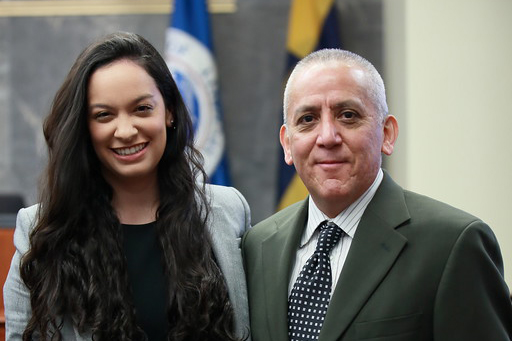
Please join me and Professor Vera in congratulating Immigration Clinic client, T-Y-, from China, and his student-attorneys, Gisela Camba, Esder Chong, Jordan Nelson, Tessa Pulaski, and Julia Yang. The client’s asylum application was filed on April 6, 2018, his interview at the Asylum Office was on November 8, 2021, and he was granted asylum on May 17, 2022. We received the decision today. The above-captioned is what T-Y- said upon learning about his asylum grant.
T-Y- is a Muslim Uyghur, an ethnic and religious minority in China. Due to his decades-long work as an Uyghur activist, he was persecuted by the Chinese government. T-Y- was falsely imprisoned, sentenced to a ‘re-education camp’, physically and psychologically tortured, and had his movements restricted and monitored. Despite everything he has endured, T-Y- continues his Uyghur advocacy work from within the United States and has even consulted with U.S. politicians and government agencies about the treatment of Uyghurs in China.
**************************************************
Alberto Manuel Benitez
Professor of Clinical Law
Director, Immigration Clinic
The George Washington University Law School
650 20th Street, NW
Washington, DC 20052
*******************************
Congratulations! Another job REALLY well done by Professors Benitez and Vera and their band of NDPA recruits at GW Law.
As Jason “The Asylumist” Dzubow says, lots of winnable cases out there if folks can get well-qualified representation and actually reach a merits determination before the Asylum Office or EOIR — no mean feat in such a backlogged system!
That raises the point of why wouldn’t a clearly well-prepared and grantable Uyghur case like this one be moved to the “front of the line” for expedited processing instead of sitting around for more than four years?
For years, both USCIS and EOIR have been “expediting” the wrong cases (known as “Aimless Docket Reshuffling”) in an ill-advised and failed attempt to use the legal asylum system as a “deterrent” by maximizing and prioritizing “anticipated denials.” Instead, they should be putting protection and excellence in preparation and advocacy first. It would actually free up more representation resources if advocates weren’t forced to “babysit” “ready for prime time” cases for years!
During that time, records must be constantly updated, memories fade, and witnesses can become unavailable. Attorneys on both sides move on. Judges retire. There are all sorts of “below the radar screen” costs to creating and maintaining a huge backlog. Unfortunately, it promotes the “refugee roulette” image of what is supposed to be a fair, expert, timely system (but isn’t).
In addition, many of the “haste makes waste” attempts to cut corners by prejudging and denying certain cases, or creating “defective in absentias” end up being reopened or remanded because of sloppy, substandard work.
What is the Government’s “vision” of how this system can be made to work in a fair and timely manner for all concerned?
🇺🇸Due Process Forever!
PWS
05-25-22
